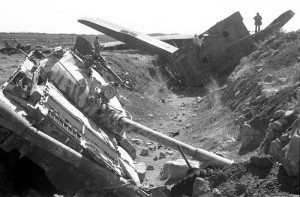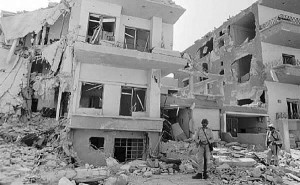
Okay, actually I should have written “Tomorrow in Israeli History,” but since I will be observing Yom Kippur, I am posting this today. As many of you know, this Yom Kippur (Day of Atonement) marks the 40th anniversary of one of Israel’s more difficult wars — the 1973 Yom Kippur War.
You will most likely see many articles and posts about the war, and so I will not summarize the entire thing. But I would like to make a few points that may be less known or about which people may have some misconceptions.
For starters, I want to talk about the outbreak of the war. I know that when I was growing up and heard about the war, the view I had (or perhaps was given) was that the Arab armies of Egypt and Syria had done something pretty horrible and audacious by attacking Israel on Judaism’s holiest day, Yom Kippur. It was also portrayed as a major surprise attack for which we were unprepared.
As with many things, this is not quite accurate. Firstly, that date in 1973 fell out during Ramadan, the month-long Muslim fast, and thus was not necessarily the ideal time for these armies to attack either. So why did they attack that day? Because that was the ideal day for the Egyptians to cross the Suez Canal into Sinai, based on the water level. It was a decision based on pure military strategy, not some kind of “dirty trick” designed to catch the Jews by surprise when they were all in synagogue. In fact, the timing of the attack worked to Israel’s benefit. Reservists were more quickly contacted (since they were easy to find), and due to the lack of other traffic on the country’s roads, they all reached the front hours earlier than they would have on a normal day.
Additionally, though nothing was certain, the Israeli government had much more advance knowledge of the attack than is widely believed. For example, King Hussein of Jordan had personally warned Israeli Prime Minister Golda Meir of the impending joint attack. Rather than Israel being unprepared for the attack, it simply misjudged the accuracy of the advance warnings they had.

Another aspect of the war that is often overlooked is its relation to the global political context. Israel’s major ally and supplier in this war was the United States, while Syria and Egypt were supported by the Soviet Union. Thus, in many ways, the Yom Kippur War was a testing ground for new military technologies of those two superpowers.
For example, Syrian tanks were equipped with Soviet night vision technology. This greatly aided them during one of the harshest tank battles in history — the Valley of Tears. Such technology was a huge advantage for Syria. One of the major reasons Israel was able to eventually gain the upper hand in that battle had less to do with technology, and more to do with Israel’s military mentality. Syria would fire a shell, assess, shift and then fire again. Israel, on the other hand, would adjust on the fly, and typically fired 2 or 3 shells for every one that the Syrians fired.
The last thing I want to discuss is the outcomes of the war. Following the incredible Israeli victory in the 1967 Six Day War, Israel felt invincible. And though Israel ended up victorious in 1973 as well, the losses it incurred were monumental. Thus, the national attitude shifted, leading to Prime Minister Golda Meir’s resignation (even though the Agranat Commission declared that she was not directly responsible for the failures of the war) and Yitzhak Rabin’s ascendance to the position. On the opposite side, Egypt had felt devastated following 1967. Their successes during the ’73 war allowed Egypt to save face, and gave Sadat the credibility he needed as Nasser’s successor. These changes in their respective countries in many ways led to the eventual Egypt-Israeli peace treaty in 1979.
On this Yom Kippur, I wish us all a year of peace. May we never know wars again!
